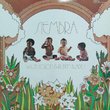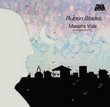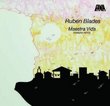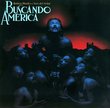| All Artists: Willie Colon, Ruben Blades Title: Canciones De Solar De Los Aburridos Members Wishing: 1 Total Copies: 0 Label: Fania / Umgd Original Release Date: 1/1/2006 Re-Release Date: 4/25/2006 Album Type: Original recording remastered Genres: International Music, Jazz, R&B, Latin Music Styles: Latin Jazz, Soul-Jazz & Boogaloo, Soul, Tropical, Salsa Number of Discs: 1 SwapaCD Credits: 1 UPC: 877313000443 |
Search - Willie Colon, Ruben Blades :: Canciones De Solar De Los Aburridos
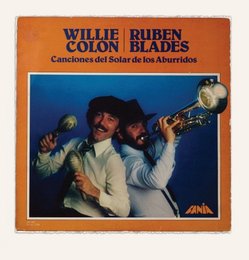 | Willie Colon, Ruben Blades Canciones De Solar De Los Aburridos Genres: International Music, Jazz, R&B, Latin Music
|
Larger Image |
CD DetailsSimilar CDs
|
CD ReviewsContains a couple of classics ernesto199 | Florida | 12/20/2002 (4 out of 5 stars) "Although several of the songs on these records are not ones Ruben is particularly proud of, at least three of them are fundamental, must have, classics for any serious Ruben fan. The first song, Tiburon (shark), is my particular favorite. One of the key elements is the rich bass line which "grooves" the entire song throughout its two major sections. The song also contains great production (ocean sounds accompanied by "wave lifting" violins). Then, when you already thought you just heard a masterpiece the second portion starts. This could've basically been a second song altogether. The brass section on this second part is excellent. If it wasn't enough the poignant lyrics strongly criticize the United States foreign policy of the time (clearly mentioning its involvement in El Salvador), the shark (tiburon) being a metaphor for the invader lurking near the coastline. In fact, the song was banned from airplay in several radio stations in Miami at the time. Now, that's what I call a masterpiece." Willie Colon/Ruben Blades "Canciones Del Solar De Los Aburri Victor M. Monsanto | Bayam�n, PR | 04/18/2005 (5 out of 5 stars) "The Poet, Ruben Blades join Willie Colon, the man who revolutionized salsa music to make the third of three albums that you most have in your collection: "Metiendo Mano", "Siembra" and "Canciones Del Solar De Los Aburridos". This is an original album, not a compilation of "hits". 1. TIBURON (Shark) This song is a critic to the Imperialism. A five stars hit. 2. TE ESTAN BUSCANDO (They Are Looking For You) This song is about a guy who owns money to the mob. A five stars hit. 3. MADAME KALALU (Madame Kalalu) This song is so funny. Is about psychics and those who believe in them. A five stars hit. 4. EL TELEFONITO (The Telephone) This is the song that star the jokes between Ruben Blades and El Gran Combo. Is about a guy whose girl friend don't let pass an hour without call him. This song is pretty good, but not that good. Maybe a four stars hit. 5. Y DEJA (And Halt) This song is not that good. 6. LIGIA ELENA (Ligia Helen ) This is a funny love song. Is a some kind of reversed Cinderella story, where a rich girl left her home and escape with a poor musician against her parents will. A five stars hit. 7. DE QUE (For What?) This song is a critic to avarice, envy, and all those defect many people suffer today. A five stars hit. " RUGE LA MAR EMBRAVECIDA, ROMPE LA OLA DESDE EL HORIZONTE, BR Rafael Cova | Caracas, Venezuela | 07/30/2010 (5 out of 5 stars) "This album brings me the most beautiful memories of when I was a child and my older brothers listened to their vinyl discs.
"Tiburón" against the system (a real bomb). "Te Están Buscando" wonderfully built, delightful melodies. "Madame Kalalú" jeje so funny but so real (for the false witches) "El Telefonito" don't answer the phone (so funny) "Y DEJA" is a beautiful song, beautiful melodies. "Ligia Elena" the poor trumpet player who falls in love for a rich girl. "De Que?" an amazing song. So many things could be said of this record, that my words will do little honor this beautiful jewel of Willie Colon & Ruben Blades, these two artists broke with all parameters set, singing against the system (politics), love songs (dislike), funny, smart, intellectual and other times sad. Thanks god and Fania Records label too was launched, its website is great, a lot of information (very good), have released many albums (not all), the remastering of the records is impeccable, with great emotion and feeling I write these words on one of my favorite records from thousands of discs. Now I leave a very special review from the website of Fania Records where make a special honor this spectacular album, a nice review written by John Child... ...Willie Colón and Rubén Blades, the pioneers of what became known as "conscious salsa," first encountered each other when Colón performed with his band in Blades' native Panama in the late 1960's. Blades resumed contact with Colón when he visited New York, courtesy of a cheap flight obtained from his brother who worked for an airline. During his stay there, he recorded De Panama a Nuevo York (1970, Alegre Records) with the Pete "Boogaloo" Rodríguez band. It was not until after Blades had relocated to New York at the end of 1974 (via Miami, where his family was exiled in 1973) to initially work in the Fania Records mailroom that an opportunity arose to sing and compose a track on Colón's album The Good, The Bad, The Ugly (1975, Fania Records). The award-winning song El Cazangero, a stirring indictment of repression in Latin America, heralded the tenor of their future collaborations, which began in earnest with the 1977 hit Metiendo Mano! on Fania. The album spawned the hit Pablo Pueblo, regarded by Blades as "the first (salsa) song that dealt with political and social overtones." Their record-breaking bestseller Siembra (1978, Fania) made them a new musical force, thanks to hits such as Pedro Navaja (perhaps his most famous composition: a reworking of Mack the Knife) and Plástico (a critique of artificial and shallow lifestyles and a call for Latino unity, hope and freedom) proving that salsa need not be formulaic escapism. The controversial two-disc concept album Maestra Vida (1980) about the lives of ordinary Latin Americans mixed songs and theatrical elements. "Willie brought in his producing talent, his insight into what people like to hear and how, and his arrangement ideas," commented Blades about their marriage of talents. "I brought in the lyrics, the stories, the understanding of the Latin American from our position, not from the North, but from our perspectives. The combination proved successful and explosive." Their penultimate collaboration for Fania, the Grammy-nominated Canciones del Solar de los Aburridos (Songs From The Tenements Of The Bored; 1981), did not receive much air play in New York at the time of its release. This was largely due to deejays shying away from the opening cut Tiburón (literally meaning "Shark"; figuratively meaning "Imperialism"), arguably the duo's most contentious recording commenting on U.S./Latin American policy. Composed by Blades, as were all but two of the tracks on the album, the song led to accusations that he was a communist sympathizer and effectively alienated him from the Cuban community in Miami. Incidentally, the snippet of a soca tune playing on the radio during the introduction of Tiburón is Indian Party by KD (Keith Dominic Len Raphael), a hit out of 1981 Trinidad Carnival. Te Están Buscando tells a somewhat humorous everyday barrio story about a wary gambler dodging loan sharks literally baying for his blood. Conguero Milton Cardona, who joined Colón's band in the early 1970's, takes an awesome solo and trombone and violin player Louie Kahn, a stalwart of the Larry Harlow organization, and contributes charanga-style violin riffing to the all-trombone sound. Madam Kalalú is another comical piece about a fake spiritualist who relieves her client of his money and possessions. El Telefonito, a song about avoiding pestering phone calls, has some nice trombone action. The delicate love song Y Deja (meaning: "And Let Me") by the Cubans Gerardo Piloto and Alberto Vera is given a cool Brazilian samba groove and features an ethereal Stéphane Grappelli-esque violin solo from Louie Kahn. Blades' composition Ligia Elena addresses racism through a tale about a white society debutant who falls for a black trumpet player. The concluding track, ¿De Qué?, has a joropo rhythm from Venezuela, where Colón and Blades acquired megastar status at the time. Their final Fania outing together, 1982's The Last Fight, was released in tandem with a motion picture of the same name, in which they both starred. Ominously titled, the movie was Fania Records Jerry Masucci's attempt to break into the film industry, and it flopped badly. Colón and Blades later had a major falling out, and in fact, did not share a studio for their Grammy-nominated reunion project Tras La Tormenta (1995, Sony Tropical). They reunited in 2003 for the critically acclaimed Siembra 25th Anniversary Concert, packing Puerto Rico's Hiram Bithorn Stadium with 27,000 fans. Reflecting on his early days of performing "conscious salsa" with Blades, Colón said in 1991: "that type of composition caused us a lot of trouble, so much so that at one point when we were doing Pedro Navaja and Tiburón with Blades, we had to perform in bulletproof vests." " |

 Track Listings (7) - Disc #1
Track Listings (7) - Disc #1
